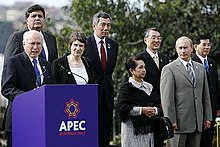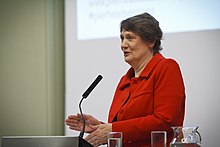Helen Clark
Her first parliamentary intervention, on taking her seat was on 12 April 1982 to give notice, she would move a motion condemning the US Navy's deployment of nuclear cruise missiles in the Pacific [22] Two weeks later in her maiden speech, with unusual emphasis on defence policy and the arms race, Clark again condemned the deployment of cruise, Pershing and SS20 and the global ambitions of both superpowers navies, but claimed the Soviet admirals did not plough New Zealand's waters and expressed particular concern about the expansion of the 1965 memo of ANZUS understanding for the resupply of weapons to New Zealand to include nuclear weapon resupply.
[28] She was particularly critical of Moore for delivering blurred messages during the 1993 election campaign, and accused him of failing to re-brand Labour as a centre-left party which had jettisoned Rogernomics.
Shortly before the election she also achieved a rapprochement with Moore (who was previously thinking of setting up his own party) who accepted the foreign affairs and overseas trade portfolios, calming internal tensions.
[41] Clark entered office just three years after the adoption of the Mixed Member Proportional (MMP) voting system, which had produced an unstable National-led government under Bolger and Shipley.
[46] Commentators praised Clark (along with Michael Cullen, the Minister of Finance) for overseeing a period of sustained and stable economic growth, with an increase in employment that saw a gradual lowering of the unemployment rate to a record low of 3.6% (in 2005).
[50] The 1999 general election produced a historic moment for New Zealand; for the first time, two women, Clark and Shipley, campaigned against each other as leaders of the country's two major parties.
[55] In January 2000, the then Police Commissioner, Peter Doone, resigned after The Sunday Star-Times alleged he had prevented the breath testing of his partner Robyn, who had driven the car they occupied, by telling the officer "that won't be necessary".
[57] In 2000, Labour MP Chris Carter investigated the background of one of Clark's Cabinet colleagues, Māori Affairs Minister Dover Samuels, regarding allegations of historic statutory rape.
She visited "Ground Zero", the former site of the World Trade Center, where the New York City Police Department presented her with a New Zealand flag that had been recovered from the rubble after the September 11 attacks.
[66] Clark's apology was made in Apia during the 40th anniversary of Samoa's independence and televised live to New Zealand where Samoans applauded the Prime Minister's gesture.
Political opponents claimed that Clark could have continued to govern, and that a snap election was called to take advantage of Labour's strong position in opinion polls.
[69] In opinion surveys conducted during the election campaign, Clark scored high approval ratings and was far ahead of other party leaders as "preferred Prime Minister".
[71] The debate was reignited when investigative journalist Nicky Hager published a book, Seeds of Distrust, in which he alleged that Clark's government had covered up a contamination of genetically modified corn plants in 2000.
[81] Clark's foreign policy reflected the priorities of liberal internationalism, especially the promotion of democracy and human rights; the strengthening of the role of the United Nations; the advancement of antimilitarism and disarmament; and the encouragement of free-trade.
[83] On 17 July 2004, a motorcade involving police, Diplomatic Protection Squad, and Ministerial Services staff reached speeds of up to 172 km/h when taking Clark and Cabinet Minister Jim Sutton from Waimate to Christchurch Airport so she could attend a rugby union match in Wellington.
[92] On Armistice Day, 11 November 2006, Clark attended a service in Hyde Park, London, where a monument commemorating New Zealand's war dead was unveiled.
[97] Portrayals of Clark as controlling and manipulative after the 2005 election increased when she abandoned her consensus-managerial approach, such as during the New Zealand foreshore and seabed controversy, and her support of the Crimes (Substituted Section 59) Amendment Act 2007 (the so-called anti-smacking law).
[42] Likewise, commentator John Armstrong, while praising Clark, describes her as a "technocratic" prime minister "who will be remembered more for her management abilities than a capacity to inspire".
[118] The New Zealand Government strongly supported her nomination, along with Australia, the Pacific Island nations and Prime Minister of the United Kingdom, Gordon Brown.
She also received the support of the five countries on the bureau of the UNDP board (Iran, Haiti, Serbia, The Netherlands and Tanzania) and was unanimously confirmed by the General Assembly on 31 March.
[128] On 24 May 2016, a Foreign Policy article alleged that Clark's tenure as Administrator had "left a trail of embittered peers and subordinates", and accused her of "undercutting the UN's promotion of human rights".
[141] During the United Nations Secretary General Candidate informal dialogues, Clark said that the UN needed to deal quickly with sexual exploitation and abuse, and gender-based violence by peacekeepers.
She served in the role alongside former Liberian President Ellen Johnson Sirleaf, and of her appointment Clark said she hesitated before accepting because she felt the panel's task was "mission impossible".
[146] Clark's appointment to this panel drew criticism from UN Watch's Executive Director Hillel Neuer, who criticised her close ties with the pro-Beijing UN Goodwill Ambassador James Chau and her previous endorsement of Cuba for sending medical personnel abroad.
[156] In March 2001, Clark referred to National MP Wyatt Creech as a "scumbag" and a "sleazeball" for having raised the issue of a potential conflict of interest involving Davis, who was leading an academic research team studying government health reforms.
"[169] In April 2024, Clark criticised the National-led coalition government's interest in associate membership of AUKUS, stating that New Zealand foreign policy towards its Western allies was lurching away from "hitherto bipartisan settings."
[170] In July 2024, Clark joined former National and ACT leader Don Brash in criticising the Government's perceived pro-US shift in New Zealand foreign policy.
This came in response to Prime Minister Christopher Luxon's remarks that the Government would be more willing to disclose cases of Chinese espionage in New Zealand and participating in AUKUS Pillar 2.
[192] A satirical book, later adapted as a play, titled On the Conditions and Possibilities of Helen Clark Taking Me as Her Young Lover, by Richard Meros, was published by Lawrence and Gibson in 2005.
Clark said concerts at Eden Park stadium would "represent a home invasion of noise" and told a planning hearing the bid for six gigs a year should be rejected.










